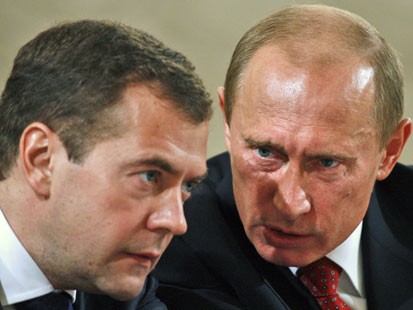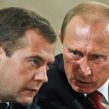
ANALYSTS AND ORDINARY CITIZENS PREDICT SHIFT OF POWER FROM RUSSIAN PRESIDENT TO PRIME MINISTER
Publication: Eurasia Daily Monitor Volume: 5 Issue: 45
By:

In a poll by the independent Levada Center among 1,600 Russians conducted over February 22-25, 61% of the respondents said they agreed with the view that despite Dmitry Medvedev’s victory in the March 2 presidential election (which was a foregone conclusion even a week or so before the vote), “power in the country will remain in the hands of [Vladimir] Putin and his entourage.” Only 22% of the respondents said that they disagreed with that statement, while 17% indicated that they were not sure. Asked how long they thought Medvedev would serve as president, 44% of the respondents said one term, 16% said two terms, nine percent said less than one term, and two percent said more than two terms. Still, it is worth noting that, according to the Levada Center, 50% of those polled back in 2000 said they thought Putin would serve one term, 13% said they though he would serve two terms, six percent said he would serve less than one term, and six percent predicted he would serve more than two terms (Levada.ru, March 5).
The Levada Center’s Leonid Sedov said that the results of this poll can be interpreted as a desire for Putin to remain at the helm of the ship of state. “As a matter of fact, Medvedev was elected as a continuer of Putin’s course, as a successor whom the current president himself pointed to,” Sedov told Novye Izvestiya. “It is the hope that Putin’s influence will remain decisive, that he will define the course that the country will move along.” Sedov also said that people simply do not know Medvedev or how he will act in the post of head of state. “People know Putin, they support him, but Medvedev still remains off-camera,” he added (Novye Izvestiya, March 7).
On the other hand, in a poll conducted among 1,600 Russians by the state-run VTsIOM polling agency over February 16-17, 56% of the respondents said that once Putin steps down as president, the “main power” should be in the hands of the new president with Putin remaining a “prominent political figure.” Only 25% of those polled said that all the levers of power should remain in Putin’s hands, while 10% said Putin should leave politics altogether in order to “allow the new president to run the country completely independently.” Still, 88% of the respondents said they thought Putin will continue to play an important role in Russian politics, while only five percent said he will not continue to play an important role in Russian politics. Perhaps more significantly, 62% of those polled said they thought that if Putin becomes prime minister, then an “essential part” of the powers of the president will be transferred to the prime minister. Only 19% of those polled said they thought such a redistribution of powers would not happen were Putin named prime minister (Wciom.ru, March 7).
One leading analyst said that he believes such a redistribution of powers between the president and prime minister will take place soon, and that it will have to be formalized in order to prevent confusion within the state bureaucracy and the ruling elite more generally.
“Both Dmitry Medvedev and Vladimir Putin constantly repeat that everything will be OK because they have good, trusting, cooperative relations and complete mutual understanding,” said Dmitry Badovsky, deputy director of the Institute of Social Systems. “But the whole point is that the bureaucracy, the ruling class in general, officials – they do not participate in these cooperative relations directly and understand only very clear, distinct institutional signals – who makes the decision, who signs [documents] … Therefore, the main thing, I think, is that there will be changes soon, and they must be institutionally locked in, and officials, the bureaucracy, the ruling class must receive clear instructions and directions as to how the configuration of power has changed. Because otherwise, if all of this is not locked in, then of course the elite will try to verify how all of this now actually works and [this verification process] will take on under-the-carpet, shady forms … Therefore I think that we will see amendments to legislation, we will see new kinds of norms” (“Vlast,” RTVi, Ekho Moskvy, March 7).




